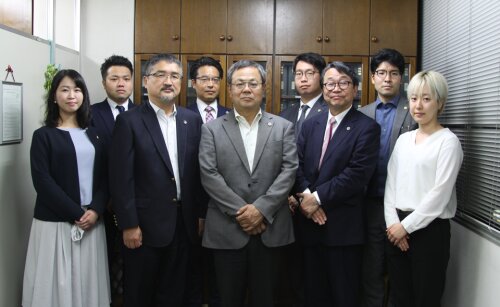Best Sexual Harassment Lawyers in Shizuoka
Share your needs with us, get contacted by law firms.
Free. Takes 2 min.
List of the best lawyers in Shizuoka, Japan
About Sexual Harassment Law in Shizuoka, Japan
Sexual harassment in Shizuoka is governed primarily by national Japanese law, which applies throughout the country, combined with prefectural and municipal measures that provide local support and enforcement. Key elements include employer obligations to prevent and address harassment in the workplace, legal pathways for criminal prosecution when conduct amounts to assault or indecent acts, and civil remedies for victims who seek compensation for harm. In practice, victims can pursue internal workplace complaints, administrative complaints with labor authorities, civil claims for damages, and criminal complaints to the police. Local government offices and support centers in Shizuoka offer counseling and practical assistance.
Why You May Need a Lawyer
You may need a lawyer if you are facing sexual harassment and want legal protection, redress, or advice about the best course of action. Common situations where legal help is important include:
- Your employer does not take appropriate steps after you report harassment, or an internal investigation is mishandled.
- The harassment is ongoing, severe, or includes physical assault, stalking, or threats.
- You want to pursue compensation for emotional distress, lost earnings, or reputational damage.
- You are considering filing a civil suit, seeking a protective order, or making a criminal complaint and want legal representation.
- You are worried about retaliation, dismissal, or negative performance reviews after making a complaint.
- You need help preserving evidence, preparing witness statements, or negotiating a settlement or reinstatement.
Local Laws Overview
Key legal aspects relevant in Shizuoka include the following:
- Equal Employment Opportunity Law: Employers are required to take measures to prevent and respond to sexual harassment in the workplace. This includes establishing complaint procedures and providing appropriate responses when harassment is reported.
- Civil Law: Victims can bring civil claims for torts under the Civil Code, seeking damages for mental distress and other losses caused by harassment or illegal acts.
- Criminal Law: Conduct such as sexual assault, indecent assault, forced acts, and some forms of stalking can be criminal offenses under the Penal Code and the Anti-Stalking Act. Victims can report such conduct to the police.
- Administrative and Labor Remedies: Victims can file complaints with labor authorities and request administrative guidance. Labor bureaus and relevant prefectural offices may investigate and require employers to take corrective action.
- Local Support and Ordinances: Prefectural and municipal gender-equality centers and human rights consultation desks in Shizuoka provide counseling, mediation, and referrals. These bodies may also offer guidance on non-criminal remedies and prevention measures.
Frequently Asked Questions
What behavior counts as sexual harassment?
Sexual harassment covers a wide range of behavior that has a sexual nature or targets someone because of sex and that creates an intimidating, hostile, or offensive environment. Examples include unwanted sexual comments, sexual jokes, inappropriate touching, requests for sexual favors, persistent unwanted attention, sexual gestures, explicit messages, and any conduct that affects employment conditions or creates discomfort at work. Both quid-pro-quo harassment and hostile-environment harassment are included.
How should I report sexual harassment at my workplace in Shizuoka?
Check your employer's harassment policy and follow the internal reporting procedure if you feel safe doing so. Report the incident to your supervisor, HR, or the designated contact. If your employer has no clear procedure or fails to act, you can contact the prefectural labor bureau or consult a local gender-equality or human rights center for guidance. If the conduct may be criminal, you can also report to the police.
If I report harassment, will my employer be held responsible?
Employers have a legal duty to take reasonable steps to prevent sexual harassment and to respond appropriately when they receive complaints. If an employer fails to act, it may face administrative action, reputational harm, and civil liability. Whether an individual employer will be held legally responsible depends on the facts, including whether the employer knew or should have known about the harassment and whether it took reasonable measures to stop it.
Should I file a criminal complaint or a civil lawsuit?
Criminal complaints are appropriate when the conduct involves assault, indecent behavior, threats, or other criminal acts. Criminal cases are prosecuted by public prosecutors and can result in penalties against the perpetrator. A civil lawsuit seeks compensation for harm and can be used together with a criminal complaint. Choosing between criminal and civil options depends on your goals - punishment of the offender, compensation, or both - and on the available evidence. A lawyer can help you decide the best path.
What kind of evidence is most useful?
Keep detailed records: dates, times, locations, descriptions of incidents, and names of witnesses. Preserve electronic evidence such as emails, messages, social media posts, call logs, and photos. Obtain medical reports if you sought treatment, and get written witness statements when possible. Preserve any internal complaint forms and responses from your employer. Early documentation improves credibility and legal options.
How long do I have to take legal action?
Time limits vary depending on the type of claim. There are statutory limitation periods for civil claims and different rules for criminal reporting. Because limitation periods can affect your ability to pursue remedies, it is important to seek advice promptly. A lawyer or a local consultation service can explain the relevant deadlines for your situation.
What protections exist against retaliation?
Japanese law discourages retaliation against people who report harassment. Employers are expected to protect complainants from adverse treatment. If you face retaliation such as demotion, dismissal, or unjustified disciplinary action after making a complaint, you may have grounds for an employment claim. Document any retaliatory acts and seek legal advice quickly.
Can I get a restraining order or other protective measures?
If the conduct involves stalking, threats, or physical danger, you may be able to obtain protective measures such as a restraining order under the Anti-Stalking Act or similar provisions. For immediate danger, contact the police. For workplace-related protection, employers can be asked to alter schedules, relocate employees, or take disciplinary action. A lawyer can advise on legal procedures to secure protection.
How much will a lawyer cost and are there low-cost options?
Legal fees vary by lawyer and the type of service. Initial consultations are sometimes free or low-cost, but full representation for litigation or criminal defense will cost more. Low-cost or free legal consultation options are available through the local bar association, public legal aid organizations, and Japan Legal Support Center. If you have limited income, legal aid may be available to cover lawyer fees for certain cases.
What should I bring to a legal consultation?
Bring a clear timeline of events, any written and electronic evidence, internal complaint documents, medical or counseling records, any communication with your employer, and the names of possible witnesses. Prepare a short summary of your objectives - for example, you want compensation, a public apology, protective measures, or to stop the harassment. This helps the lawyer assess the case efficiently.
Additional Resources
When seeking help in Shizuoka, consider contacting the following types of organizations and offices for counseling, information, and referrals:
- Shizuoka Prefectural Gender Equality Center and municipal gender-equality consultation centers for counseling and guidance.
- Shizuoka Prefectural Labor Bureau or local labor standards office for workplace complaints and administrative assistance.
- Local police for criminal incidents, threats, and immediate safety concerns.
- Shizuoka Bar Association or local lawyers experienced in employment law, civil torts, and criminal matters for legal representation.
- Japan Legal Support Center (Houterasu) for information about legal aid and referral to lawyers.
- Counseling and support centers for sexual violence survivors, which can offer medical referrals, counseling, and practical support such as safety planning.
Next Steps
Follow this practical sequence if you need legal assistance for sexual harassment in Shizuoka:
- Ensure your immediate safety. If you are in danger, contact the police right away.
- Preserve evidence. Record dates, times, witness names, and save electronic communications and documents.
- Seek medical care if necessary and obtain medical records that document injuries or trauma.
- Check your employer's internal complaint procedure and report the harassment if it is safe to do so. Keep copies of any reports and employer responses.
- Contact local support services in Shizuoka for counseling and practical assistance, including gender-equality centers and victim support organizations.
- Consult a lawyer or use a low-cost legal consultation service to review your options - criminal complaint, administrative complaint, civil suit, or negotiation and settlement.
- If seeking legal representation, bring your evidence and a written timeline to the first meeting. Ask about likely outcomes, timeframes, fee structures, and alternative dispute resolution options.
- Consider parallel steps where appropriate - for example, filing a criminal complaint while pursuing civil remedies or requesting administrative intervention from labor authorities.
- Protect your mental and physical health by accessing counseling and support networks during the process. Legal matters can take time, and support is important.
Taking early, informed steps and getting professional legal advice will help you preserve options and pursue the outcome you need. If you are unsure how to begin, start with a confidential consultation at a local gender-equality center or with a legal aid service in Shizuoka.
Lawzana helps you find the best lawyers and law firms in Shizuoka through a curated and pre-screened list of qualified legal professionals. Our platform offers rankings and detailed profiles of attorneys and law firms, allowing you to compare based on practice areas, including Sexual Harassment, experience, and client feedback.
Each profile includes a description of the firm's areas of practice, client reviews, team members and partners, year of establishment, spoken languages, office locations, contact information, social media presence, and any published articles or resources. Most firms on our platform speak English and are experienced in both local and international legal matters.
Get a quote from top-rated law firms in Shizuoka, Japan — quickly, securely, and without unnecessary hassle.
Disclaimer:
The information provided on this page is for general informational purposes only and does not constitute legal advice. While we strive to ensure the accuracy and relevance of the content, legal information may change over time, and interpretations of the law can vary. You should always consult with a qualified legal professional for advice specific to your situation.
We disclaim all liability for actions taken or not taken based on the content of this page. If you believe any information is incorrect or outdated, please contact us, and we will review and update it where appropriate.










